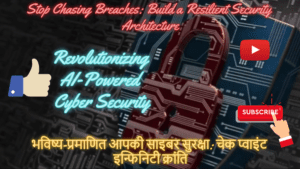We all know the feeling of getting that email saying our data might have been compromised in a security breach. But what if I told you that even the security companies we trust can be vulnerable?

Video – https://youtu.be/8fcDrU_Kj2Q
That’s right, security vendors themselves can be hacked, which means that the patches they release to fix vulnerabilities in their products might be slow or even nonexistent. This leaves us, the customers, exposed.
So, what can we do to protect ourselves? Well, the first step is to choose a security vendor with a good track record. A vendor that prioritizes security and is constantly releasing updates and patches is essential.
Video – https://youtu.be/8fcDrU_Kj2Q

Are you tired of playing catch-up with cybersecurity breaches? It’s time to shift gears and take a proactive approach. Instead of constantly chasing after breaches, let’s focus on building a resilient security architecture that can withstand even the most sophisticated attacks.
In today’s digital landscape, cyber threats are becoming increasingly complex and frequent. Traditional security measures like firewalls and antivirus software are no longer enough to protect against evolving threats. That’s why it’s crucial to adopt a holistic approach to cybersecurity that encompasses prevention, detection, and response.
One key aspect of building a resilient security architecture is to prioritize risk assessment and mitigation. By identifying potential vulnerabilities and threats early on, organizations can take proactive steps to address them before they can be exploited by malicious actors. This involves regularly conducting security audits, penetration testing, and vulnerability assessments to stay one step ahead of cyber threats.
Video – https://youtu.be/8fcDrU_Kj2Q

Additionally, organizations should invest in advanced threat detection and response capabilities. This includes deploying security technologies such as intrusion detection systems, security information and event management (SIEM) platforms, and endpoint detection and response (EDR) solutions. These tools can help organizations detect and respond to security incidents in real-time, minimizing the impact of breaches and preventing them from spreading further.
Furthermore, building a resilient security architecture requires a cultural shift within organizations. Cybersecurity should not be viewed as solely the responsibility of the IT department, but rather as a shared responsibility across the entire organization. This means providing comprehensive cybersecurity training to employees at all levels, raising awareness about common cyber threats and best practices for preventing them.
Video – https://youtu.be/8fcDrU_Kj2Q
Here are some additional tips for beefing up your cyber security:
- Use strong passwords and change them regularly.
- Be careful about what information you share online.
- Be wary of phishing emails and suspicious links.
- Keep your software up to date, including your security software.
By following these tips, you can help to protect yourself from cyber security threats. But remember, even the best security can’t guarantee that you’ll never be hacked. So it’s important to be vigilant and stay informed about the latest threats.

Video – https://youtu.be/8fcDrU_Kj2Q
In conclusion, the key to effective cybersecurity lies in building a resilient security architecture that can adapt to the ever-changing threat landscape. By prioritizing risk assessment, investing in advanced threat detection and response capabilities, and fostering a culture of cybersecurity awareness, organizations can strengthen their defenses and stay ahead of cyber threats. So, let’s stop chasing breaches and start building a stronger, more resilient security architecture today.
Video – https://youtu.be/8fcDrU_Kj2Q
